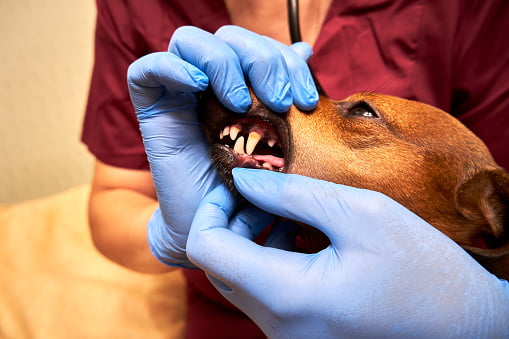As with humans, once gum disease starts taking effect, there aren’t any outward signs that something’s occurring. Instead, symptoms can only be felt once the disease has progressed, devastating your dog’s mouth and causing chronic pain, gum erosion, tooth loss and bone loss. Bacteria is ultimately the antagonist when it comes to gum disease. After your dog eats, bacteria and other particles begin to produce plaque over the teeth. This bacteria is responsible for causing many oral health issues that need to be dealt with sooner rather than later.
In dogs, once their system recognizes a foreign bacteria in the mix, it releases white blood cells to defend itself. The bacteria then tells the white blood cells to release enzymes that, in turn, break down gum tissue, leading to inflamed gums, damaged tissue and bone loss.
Symptoms of Gum Disease
As mentioned before, there are no physical symptoms of gum disease when it first starts. It’s common for owners to not take notice of the disease while it’s forming until it’s in the advanced stages. By then, your pet will likely be experiencing chronic pain, something they’ll often hide in order to avoid displaying weakness. Other symptoms your canine may be experiencing include issues picking up food, red or bleeding gums (in the mouth or in their drinking water), tooth loss, bad breath, bumps in the mouth, chewing on one side of the mouth, nasal discharge and not wanted their head touched.
Preventing Gum Disease
As with human teeth, you should be brushing your dog’s teeth twice a day to ensure good oral health. Doing so will minimize the bacteria and other by-products in their mouth. It’s also important that you take them to the vet for regular dental cleanings and oral exams. A trained veterinarian will be able to get a better understanding of your dog’s health and can treat it as is necessary. Feeding your dog good quality food that will help them scrub their teeth as well as strengthen their jaw is also essential. Lastly, consider buying them more chew toys, as this will help to stop the formation of gum disease.
Treating Your Dog
If your canine friend already has gum disease, then you’ll need to see your vet and have them treated immediately. If left untreated, it can increase your dog’s risk of heart, liver and kidney disease. It can also destroy bone to the extent that light pressure can fracture a weakened jaw.
At Aquitaine Animal Hospital, our experienced and dedicated staff will do whatever they can to ensure your dog is comfortable and being treated well. Our Mississauga vet clinic specializes in providing the best vet services for our furry patients.


Recent Comments